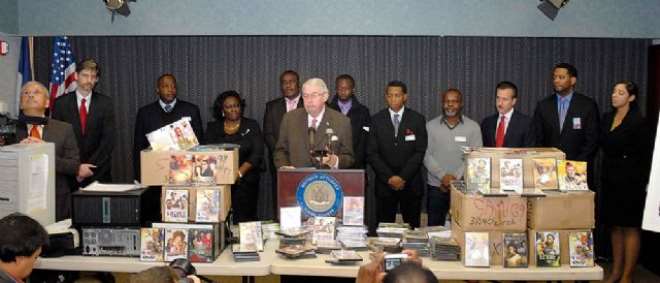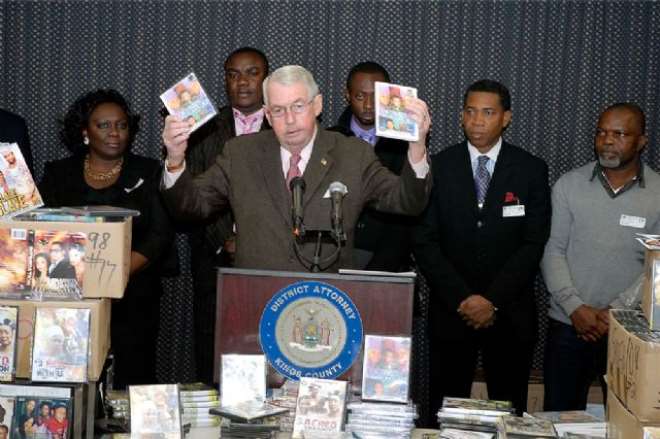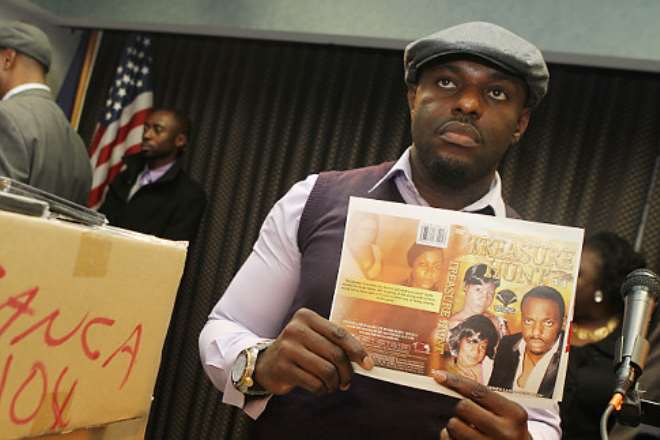NOLLYWOOD: A thing or two about piracy and lost revenues
Nigeria's movie industry 'NOLLYWOOD' has witnessed a year unlike none other with a $200 million stimulus package from Mr. President and more international producers interested in our heart land stories, it is certain Nollywood's future is extremely promising. The triumphant rise of home video production began in the early 90's with the production of 'Living in Bondage'. In the early years, there were strong story plots with passionate film makers sweating to ensure the viewers felt their passion.
This trend dwindled fast as demand for content increased and marketers were eager to see faster returns on investment, which meant hastened movie production. The demand increased and the production supply had to be rushed which inevitably replaced passionate film making with only a thirst for money. The movie productions got so fast that on average about 2000 movies were made annually.
This sales figure led to Nollywood's recognition as one of the largest Movie Industries in the World in terms of 'quantity' while Quality was a concept not understood by many. More movies equals more money, regardless of weak scripts, the marketers were mostly interested in selling any 2 hour mash-up in three instalments. This led the industry into a toxic path as respect for the industry was lost and it pretty much became a joke. On a serious note, it caricatured the works our pioneer passionate filmmakers had done to start the industry.
Today's Nollywood is way different from the Nollywood I grew up with. The Nollywood industry and African cinema in general has grown in leaps and bounds to command the respect of film veterans around the world. The next feat is to actually command the respect of viewers worldwide whom were once put off by high-quantity, low-quality mentality of the yester years of Nollywood. We are in a peculiar age and as the Industry has grown so has the challenges multiplied. A variety of challenges has haunted Nollywood since inception but one of the most important challenges spoken about in Nollywood 10 years ago were Poor distribution, Piracy.
The important challenges everyone is still speaking about in Nollywood 10 years later are still Poor distribution and Piracy. Other issues such as poor scripting, poor continuity and others are still present in some parts of today's Nollywood but issues with production are changing rapidly as exemplary movies such as The Figurine, Ije, Mirrorboy and the likes have shown us standards Nollywood is capable of achieving.
Poor distribution channels and piracy are still the bane of the industry. Poor distribution only leads to an avenue for piracy to thrive faster. In this new age of Nollywood 'Nollywood 2.0', piracy has left the realm of an individual hawking the CD copies and dodging from officials and has spread fast into the digital space. There are no known Nigerian movies presently on torrent sites but inevitably that would be a future battle to conquer. As more Nigerian movies are prominent in the spotlight and are in high demand, torrents (the deadliest form of piracy distribution) would be in full effect. Hollywood and the likes are presently facing massive loss of revenue due to torrent sites.
The reasons why torrent sites are extremely destructive to the movie industry in general is firstly, the parties who upload the movies are not motivated by money, secondly they do not charge the users for viewing and thirdly they are just so easy to find. From primary survey conducted, people lean towards torrent sites not because they hate the movie industry, they love your movie they just cannot find it legally or at a price they sense as reasonable. If the creation of adequate distribution channels for Nollywood is not placed as a priority then true success would remain distant. Pirates creep in when distribution channels are weak. My view is to learn from the pirates, study how they operate and beat them at their game. Pirates have a low cost advantage that is, they can afford to sell a movie at a lower price than the market value and still rake in a profit. According to Dickson Iroegbu, an acclaimed Nollywood director, he believes a Nigerian movie can sell for N50 and still be profitable. Most marketers might not be willing to go so low but if the price of the movie was in the N100 - N150 range for purchase in Nigeria, then some of the pirates would be deterred as their ROI won't be worth the investment. Taking this route alone could be extremely risky as Die Hard pirates would also reduce the price accordingly.
These land pirates are your competitors and you must understand how they think. Price reduction is the first option as some pirates (competitors) who do not have a low-cost advantage would rather shutdown. You have deterred some pirates by this means. The land pirates have a swift distribution mechanism. When a movie is in high-demand, and the original manufacturers cannot keep up, the pirates step into play. They are alive when there are holes in the distribution. Also they come into play where normal distribution channels might not get to like in International regions. The amount of money Nigeria loses from piracy overseas monthly if investigated would be way more than that lost annually from the domestic market. Pirates overseas are feeding off easily on sales of Nigerian Movies they are not licensed to sell which gives rise to the 'International Pirate'.
The International Pirate is classed into the Land and the Online Pirate. The Land Pirates internationally purchase movies from Nigeria, redub them and then sell overseas. They sell their movies, make their money and send no proceeds to the Movie producers. The buyer is really not at fault, most of them are looking for legal means of purchase and if the only available means is illegal, they take it. The online pirate is the one who uploads Nollywood content on the internet for public distribution without permission or a license and makes money off the content without payment of due royalties to the movie producers. This trend is on the rise. They do not charge viewers for watching the hosted movies, rather they make money off Google Ads that result from traffic generated on their website. These guys are internet entrepreneurs, so there is a general sense of intelligence I presume. Most of them might not know the act is piracy. No one pays online for a pirated movie, all online pirated movies are free, the uploaders make money mostly from Ads. Since you get money from User generated traffic, why don't you sign revenue sharing agreements with the content owners and make Nollywood sustainable. Follow the path of Jason Njoku (Iroko Partners).
The Internet Entrepreneurs would tell you they have no idea how to contact these Production houses which might be true and I would advise the film board to provide a database of all production houses online for such fellows. When contact is made to the production houses, negotiations can begin. Negotiations can go in the route of revenue sharing agreements or a lump sum purchase of the movie license. Any route that is taken, adds more value to Nollywood. My first advice to the Producers in Negotiation, never sign a deal longer than 5 years and also forget about signing exclusive rights to anyone for the time being. You need all the channels available to reach your customers, signing exclusive rights to one partner limits the number of channels you can get to which limits the amount of customers you get to and in turn limits your revenue. An exclusive right at this nascent stage to any online distributor does not make sense. Presently such producers do not have that advantage. I am not aware of the deal that was signed with Jason of Iroko Partners but if it is exclusive, the producers have cut short a flow of major revenue. Let the field be open, sign revenue sharing agreements with everybody, make money and spread the greatness of Nollywood faster. The income that would be gotten by Producers in one month would eclipse what they make from rental clubs in Nigeria annually.
This unique step would reduce the devastating impact of digital piracy to Nollywood but some Die Hard pirates would still remain. These online pirates want to eat and well die alone. The beauty about the Internet is everybody has an address that is registered somewhere. Monitor the paper trail for sites that are generating traffic with keywords such as Nollywood, Nigeria Film, Ghana film. Anyone that violates your Intellectual Property, send the webmaster a letter from your lawyer to cease and desist from such. If there is no response, take the case to court, provide evidence, get an injunction, provide your letter to the company hosting the site and the site would be taken down. It would not be that easy but a special taskforce in Nigeria for dealing with piracy both land and online has to be created to facilitate court processes. Some of the sites hosted might be in areas where there's no jurisdiction, such places might be extremely difficult to achieve your goal. In such scenarios, you can go after their source of income, report the site to Google or the Ad Manager with evidence and Google might block out their Ad Account. Lets hope such scenarios are not popular.
On the domestic side, major forms of land pirates are the rental club pirates. The rent-a-club pirates, these are the guys who run video clubs and rob the producers in both broad and narrow day light. I mean, they are just slapping the industry. I understand when Desmond Elliot (a popular Nollywood actor) says the Video Clubs have to be scrapped. I mean if people steal from you every day and you can see them but probably do nothing, you would also wish for their extinction. Some of these video club owners redub the movies and sell at a giveaway price to consumers. This is a major problem as there are more than 7000 clubs scattered across the country. Video clubs are meant to be adding more revenues to Nollywood but the relationship is parasitic. From the article 'Video rental business as a lucrative venture' by Oyetunji Abioye, most video club owners purchase movies from Marketers at the rate of N240, to rent out at the rate of N100 for a 12hour window. This is perfect business for the Club, but major revenue loss for the Movie Producer. The club has to rent the movie out to 2 people in 24 hours to break even on that movie and from thereon they keep raking in profits from that movie copy.
Marketers or producers should Renegotiate a higher license fee or sign a revenue sharing agreement. Because of nationwide spread, a good relationship with rental clubs is pertinent for the time being. But $2 as a license fee to rent out your movie is ridiculous. According to this logic, it is very clear the Video Rental Clubs as a group would even rake in more revenue than the marketers, writers, actors all combined. When I buy a movie for N240 from you, it becomes my property and I have repeat business from the rent, the Marketer only has a one off business for that movie which is the N240 paid. An option could be get the movie license at N5000 or get the operating license at N1000 and pay us a percentage you get from the revenue of my movie. This is a solid rip-off. Back to piracy in the rental clubs, you can trust the video club owners but you have to verify. I suggest periodic inspections on the video club owners and bonuses for targets met and for club owners who go the extra mile to curb piracy in their vicinity (probably by provisions of posters in their ward to sensitize the public). Bonuses could be a tax break from the Government (Nollywood needs all the government's support it can get), discount on registration fees, or anything to motivate the video club owners to be fully committed to this fight.
Other areas where revenue can be sought after to offset the lost revenues due to piracy is in Product Placements, Movie Producers need sharp marketing buffs to attract product placement deals from companies whether small, medium or large. Your budget would determine the airtime and positioning your campaign would receive. I have seen millions of mobile phones and other products used without any charge attached to it. This is a massive loss in revenue. Imagine if Blackberry Babes (a Nollywood movie) was actually sponsored by Blackberry. Almost every scene had a Blackberry Handset or Logo in it. I am not saying Research In Motion would have been willing to sponsor the movie because well the story just wasn't great, but if a decent movie with great talents attached approached MTN or a small scale business or a start up for a product placement at a sensible fee, no one loses and we have offset some losses from piracy.
From my vantage point, these are some plugs that can offset the damage from the millions of leaks presently killing the industry. There are so many other leaks that can be plugged to at least offset some losses due to piracy. In Nollywood 2.0, Product placement should be taken seriously, Video club operators should be inspected and the deals should be renegotiated, deals with television stations especially Africa Magic must be adequately renegotiated and proper domestic/international distribution has to be a priority. In fact if Mr. President's $200 million stimulus went into distribution alone, the effect would change Nollywood forever. Proper distribution is the key to piracy reduction.
Jide Rotilu is a Technology Strategist, a comedy sketch writer and an MTV Award Winner, based in England.


Latest News
-
 "If You're For Me, I Am For You" - Cubana Chief P
"If You're For Me, I Am For You" - Cubana Chief P -
 "3 Days To Go" - Femi Adebayo Urges Fans To Get S
"3 Days To Go" - Femi Adebayo Urges Fans To Get S -
 "Stop Asking Me Questions About Speed Darlington"
"Stop Asking Me Questions About Speed Darlington" -
 "Benue Is The Most Underdeveloped State I've Ever
"Benue Is The Most Underdeveloped State I've Ever -
 Stan Alieke Urges Young Professionals To Take Lin
Stan Alieke Urges Young Professionals To Take Lin -
 Chizzy Alichi Teases Fans With Baby Reveal, Promot
Chizzy Alichi Teases Fans With Baby Reveal, Promot -
 "I'm Not Wearing Makeup From July 4th Till Decemb
"I'm Not Wearing Makeup From July 4th Till Decemb -
 "Stop The Challenge Of Mocking Kids With Down Syn
"Stop The Challenge Of Mocking Kids With Down Syn -
 Regina Daniels Celebrates Sons As They Mark Birthd
Regina Daniels Celebrates Sons As They Mark Birthd -
 Speed Darlington Threatens To Sue NAPTIP For Defam
Speed Darlington Threatens To Sue NAPTIP For Defam














